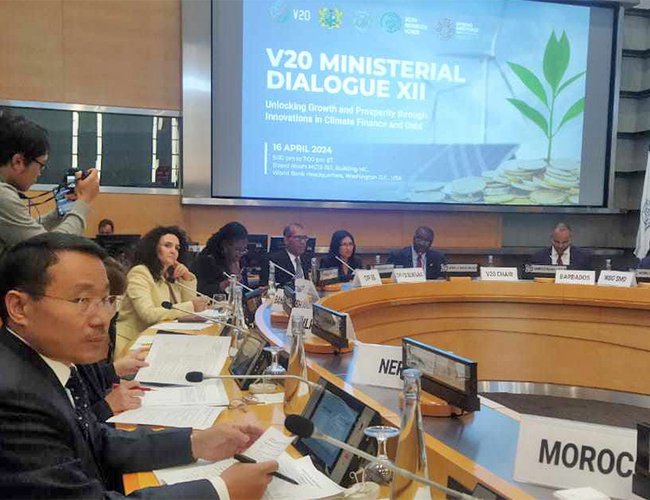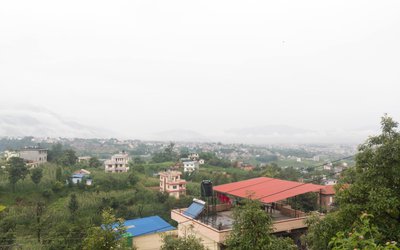
Finance Minister Varshman Pun Anant has addressed the ministerial meeting of the V-20 group of countries that are in danger due to the effects of climate change.
Pun, who arrived in the US to participate in the spring joint meeting of the World Bank Group and the International Monetary Fund, addressed the 12th ministerial level meeting of the V-20 held in Washington, DC.
Addressing the meeting, Pun said that the world community should be aware and serious about the problems faced by developing countries, including Nepal, which are at high risk of climate change.
He pointed out that there is a need for global collective commitment to avoid the risk of climate change. He said that due to the effects of climate change, especially the poor and marginalized people are being persecuted in Nepal. Minister Pun clarified that their contribution to Nepal being at a high risk of climate change is minimal.
Addressing the United Nations Conference on Climate Change (COP-28) held in Dubai, United Arab Emirates last year, Prime Minister Pushpa Kamal Dahal Prachanda recalled that even though Nepal's role was zero, it drew the attention of the world community to the issue of high risk due to the effects of climate change.
‘At the COP-28 meeting, my Prime Minister had clearly said that Nepal has a very small role in climate change, Pun said, "I want to present the message of our Prime Minister here that developed countries need urgent financial and technical support from underdeveloped countries due to the disproportionate risk of the effects of climate change." '
Minister Pun mentioned that he will strongly advocate for climate justice in the international world, saying that compensation due to the effects of climate change should be received.
He drew the attention of the world community to the rapid melting of snow in the Himalayas of Nepal due to climate change, the decrease in water flow in glaciers, the risk of explosion of snow lakes, and the increase in disasters such as floods, landslides and drought due to problems such as lack of rain and excessive rain.
Minister Pun said that due to the natural disasters caused by climate change, not only the sustainable development efforts of the front line of development, but also human health and livelihood are in danger.
Minister Pun emphasized that countries with developed economies should provide financial assistance for climate adaptation programs to third world countries like Nepal, which are at high risk even though they have a small role in climate change.
He mentioned that underdeveloped and Himalayan countries like Nepal should have the main rights in facilities such as compensation fund, biological diversity fund and adaptation fund established for damages caused by climate change.
Minister Pun reminded that developed countries should be honest in their commitments to save the world from the effects of climate change.
The V-20 is a body that raises its voice in the world community for reducing the risk of climate change and increasing financial support in the transitional situation caused by it in the global economy.
About 80 ministers of the V-20 member states, high-ranking government officials, World Bank Group President Ajay Banga, International Monetary Fund (IMF) Managing Director Kristalina Georgieva were present in the program.
- 139 People Died In The Disaster
- Jul 27, 2024
- Monetary Policy Eases Managing Capital Fund Stress
- Jul 27, 2024
- Weather Forecast: Chances Of Heavy Rainfall Is Likely In One Or Two Places Of Sudu Paschim And Bagmati Province
- Jul 27, 2024
- The Sentiment Of Monetary Policy Seems Focused On Increasing Eemand: FNCCI President Chandra Prasad Dhakal
- Jul 26, 2024
- Monetary Policy 081/82 Is Making The Economy More Dynamic: Governor Adhikari
- Jul 26, 2024
















